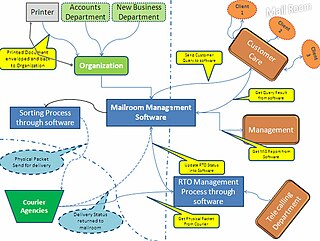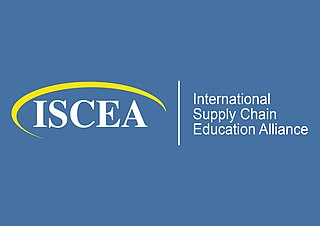A document management system (DMS) is a system used to receive, track, manage and store documents and reduce paper. Most are capable of keeping a record of the various versions created and modified by different users. In the case of the management of digital documents such systems are based on computer programs. The term has some overlap with the concepts of content management systems. It is often viewed as a component of enterprise content management (ECM) systems and related to digital asset management, document imaging, workflow systems and records management systems.
Web development is the work involved in developing a website for the Internet or an intranet. Web development can range from developing a simple single static page of plain text to complex web applications, electronic businesses, and social network services. A more comprehensive list of tasks to which Web development commonly refers, may include Web engineering, Web design, Web content development, client liaison, client-side/server-side scripting, Web server and network security configuration, and e-commerce development.

OpenText Corporation is a Canadian company that develops and sells enterprise information management (EIM) software.

The Open Group Architecture Framework (TOGAF) is the most used framework for enterprise architecture as of 2020 that provides an approach for designing, planning, implementing, and governing an enterprise information technology architecture. TOGAF is a high-level approach to design. It is typically modeled at four levels: Business, Application, Data, and Technology. It relies heavily on modularization, standardization, and already existing, proven technologies and products.

The Society of Petroleum Engineers (SPE) is a 501(c)(3) not-for-profit professional organization whose stated mission is "to collect, disseminate, and exchange technical knowledge concerning the exploration, development and production of oil and gas resources and related technologies for the public benefit; and to provide opportunities for professionals to enhance their technical and professional competence".
Enterprise content management (ECM) extends the concept of content management by adding a timeline for each content item and, possibly, enforcing processes for its creation, approval and distribution. Systems using ECM generally provide a secure repository for managed items, analog or digital. They also include one methods for importing content to bring manage new items, and several presentation methods to make items available for use. Although ECM content may be protected by digital rights management (DRM), it is not required. ECM is distinguished from general content management by its cognizance of the processes and procedures of the enterprise for which it is created.
An information professional or information specialist is someone who collects, records, organises, stores, preserves, retrieves, and disseminates printed or digital information. The service delivered to the client is known as an information service.
The term "Intelligent Enterprise" refers to a management approach that applies technology and new service paradigms to the challenge of improving business performance. The concept, as articulated in James Brian Quinn's seminal book Intelligent Enterprise posits that intellect is the core resource in producing and delivering services. The book describes the management approach and computing infrastructure needed to harness that intellect effectively. This approach is referred to in business jargon as Knowledge Management, of which Quinn was an important proponent. Quinn was the William and Josephine Buchanan Professor of Management at the Amos Tuck School at Dartmouth College.

The International Association of Privacy Professionals (IAPP) is a nonprofit, non-advocacy membership association founded in 2000. It provides a forum for privacy professionals to share best practices, track trends, advance privacy management issues, standardize the designations for privacy professionals, provide education and guidance on career opportunities in the field of information privacy. The IAPP offers a full suite of educational and professional development services, including privacy training, certification programs, publications and annual conferences. It is headquartered in Portsmouth, New Hampshire.
Document imaging is an information technology category for systems capable of replicating documents commonly used in business. Document imaging systems can take many forms including microfilm, on demand printers, facsimile machines, copiers, multifunction printers, document scanners, computer output microfilm (COM) and archive writers. Document Imaging means the conversion of paper files or microfilm / fiche to digital images. The image can be form in TEM, here the image is form by scattering of electron beam. In TLM ,the image is formed by the consequence observation of light. By the increasing thickness or density the image can be contrasted with acceleration voltage.
Established in 1991, the non-profit Network Professional Association (NPA) is a professional association for computer network professionals.
Data governance is a term used on both a macro and a micro level. The former is a political concept and forms part of international relations and Internet governance; the latter is a data management concept and forms part of corporate data governance.

The Chartered Quality Institute (CQI), formerly known as The Institute of Quality Assurance (IQA), is the chartered body for quality professionals. It improves the performance of organisations by developing their capability in quality management. As a registered charity, the CQI exists to advance education in, knowledge of and the practice of quality in the industry, the public sector and the voluntary sectors.
The Method for an Integrated Knowledge Environment (MIKE2.0) is an open source delivery methodology for enterprise information management consultants. MIKE2.0 was released in December 2006 by BearingPoint's Information Management team under the leadership of Robert Hillard. The project used Creative Commons Attribution License and was implemented by Sean McClowry. The project is now run by the MIKE2.0 Governance Association, a non-profit organisation based in Switzerland, with BearingPoint and Deloitte as the founding members. In March 2013 a book Information Development Using MIKE2.0 was published promoting it.
Electronic document and records management system (EDRMS) is a type of content management system and refers to the combined technologies of document management and records management systems as an integrated system.

Digital mailroom is the automation of incoming mail processes. Using document scanning and document capture technologies, companies can digitise incoming mail and automate the classification and distribution of mail within the organization. Both paper and electronic mail (email) can be managed through the same process allowing companies to standardize their internal mail distribution procedures and adhere to company compliance policies.
The web content lifecycle is the multi-disciplinary and often complex process that web content undergoes as it is managed through various publishing stages.
The Computing Technology Industry Association (CompTIA) is an American non-profit trade association, issuing professional certifications for the information technology (IT) industry. It is considered one of the IT industry's top trade associations. Based in Downers Grove, Illinois, CompTIA issues vendor-neutral professional certifications in over 120 countries. The organization releases over 50 industry studies annually to track industry trends and changes. Over 2.2 million people have earned CompTIA certifications since the association was established.
Robert Freeman Asleson was an American publisher who was a major contributor to the publishing, library and information industries. He led a number of key information companies as they evolved from print, to microfilm, to mainframe, CD-ROM and then web based databases. He brought professional management to entrepreneurial library companies, without which they might not have succeeded. Some of these organizations are now among the titans of the library industry.

The International Supply Chain Education Alliance (ISCEA) is a supply chain professionals certifying body best known for becoming the first organization validating the knowledge of supply chain managers around the world and providing them with the CSCM designation. Founded in 2003 and currently holding over 100,000 members, ISCEA has its World HQ office in Beachwood, OH, USA and regional offices in LATAM, EMEA and APAC. ISCEA's mission is to provide supply chain knowledge to manufacturing and service industry professionals worldwide through Education, Certification and Recognition. ISCEA is the governing body for the Ptak Prize.







